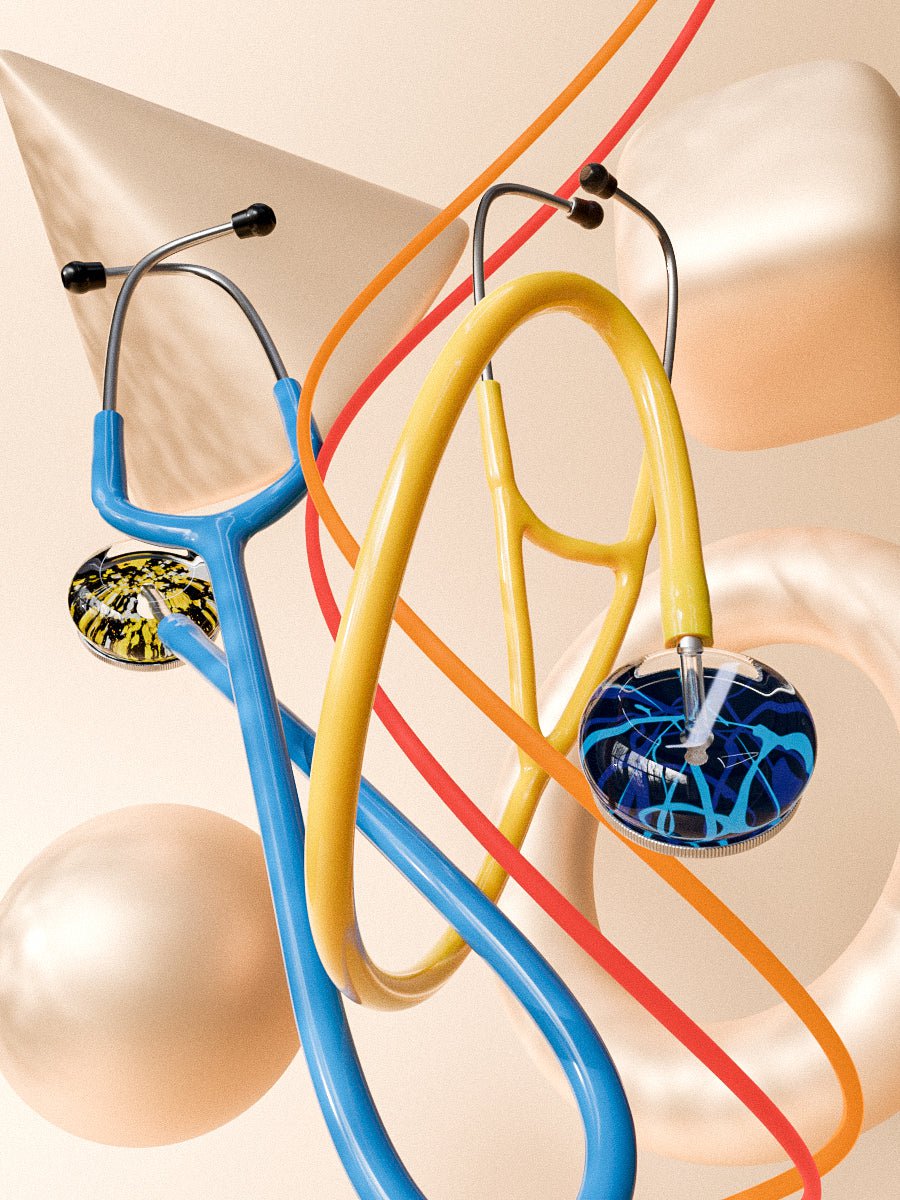Do you know if you can hear a baby's heartbeat through a stethoscope? The answer is yes, but only with an infant stethoscope. Pediatricians need to use this type of stethoscope because the smaller size will fit on babies who are premature and much tinier than your average-sized newborn. Does that mean that adult doctors can't hear a baby's heartbeat through their own personal stethoscopes? No, they can! But they have to use an infant one too.
What is a pediatrician stethoscope?
The stethoscope pediatricians use is called an infant stethoscope. The small size of the diaphragm can fit on a newborn's chest, or on other areas that are smaller than the average-sized adult body part. One thing to keep in mind when using this type of stethoscope with infants is that they have a higher pitched voice than adults do and the stethoscope can't pick up that high-pitched sound.
What is a diaphragm?
A diaphragm is a thin, circular plate of metal or plastic with an open space in its center. Diaphragms for pediatrician stethoscopes are smaller in diameter than adult stethoscopes.
I can't hear the baby's heartbeat?
When a pediatrician listens to your child with an infant stethoscope, they will not be able to hear any sounds that are high-pitched or higher in frequency. This is because babies have a different voice and the diaphragm of this type of stethoscope can't pick up those sounds.
How to Listen for a Baby's Heartbeat
When listening to an infant, place the chest piece on their back so that you can hear both sides at once. If they are lying down facing your right side, then put the diaphragm just below their left shoulder blade-
With the pediatrician's stethoscope, they will be able to hear your baby's heartbeat by placing their ear on the chest or abdomen and listening with one side of the diaphragm while cupping the other side and listening for the sound of a heartbeat through their ear.
What can be detected when using an infant stethoscope?
- heart rate
- respiratory rate
- variability in blood pressure from one heartbeat to the next
- irregular pulses or rhythms of the mother's and baby's heartbeats that can indicate an underlying problem such as premature labor, low amniotic fluid levels, umbilical cord problems, too much air under the skin (subcutaneous emphysema), or the mother having a heart attack
- soft murmurs that can indicate an underlying problem such as congestive heart failure, patent ductus arteriosus (PDA) , and hypertrophic cardiomyopathy.
This stethoscope is specifically designed for pediatricians to listen to babies' hearts. Pediatricians need to use a special stethoscope on babies because the diaphragm would be too large for an infant's chest.
What other tests can be done to listen to a baby's heartbeat?
- Listening to the baby's heartbeat can be done through an ultrasound, or a fetoscope.
Can you hear an unborn baby's heartbeat with a stethoscope on the mother's stomach?
What parts make up an infant stethoscope?
Ear pieces - , rubber diaphragm, metal chest piece
What are the most common things heard when listening to a baby's heartbeat with a stethoscope?
Normal heart rate, murmur of the ductus arteriosus (PDA), and murmurs from hypertrophic cardiomyopathy.
Can you listen to a baby's lungs with an infant stethoscope?
- Yes, you can listen to a baby's lungs with an infant stethoscope. You need to make sure that the chest piece of the stethoscope is flat on their back or side.
What are some conditions where listening for heart rate would be important?
- Conditions where listening for heart rate would be important are as follows: hypovolemia, cardiogenic shock.
What is hypovolemia and what does it sound like with a stethoscope?
- Hypovolemia is low blood volume. With a stethoscope, it can sound like tachycardia.
What are some conditions where listening for murmurs would be important?
- Conditions where listening for murmurs would be important are as follows: congenital heart disease (CHD), pulmonary embolism (PE).
What is cardiogenic shock and what does it sound like with a stethoscope?
- Cardiogenic shock is a serious condition that can occur following a heart attack or other problems with the heart. It can sound like an irregularly fast rhythm, sometimes called ventricular tachycardia.
What are some conditions where listening for bowel sounds would be important?
- Conditions where listening for bowel sounds would be important are as follows: appendicitis, diverticulitis.
How can you tell if a baby is premature or not with an external stethoscope?
- You can't tell if a baby is premature or not with an external stethoscope.
What are the most common reasons to listen to a baby's heartbeat with a stethoscope?
- The most common reasons to listen for a baby's heartbeat with a stethoscope are as follows:
If the heart rate is faster than 180 beats per minute or more, it can indicate problems such as cardiogenic shock.
How do you listen to a baby that is premature and smaller than normal sized?
- It's important to have your head close to the chest wall in order to hear cardiac sounds. If there are any doubts about whether cardiopulmonary resuscitation (CPR) can work on a premature baby, err on the side of caution and do CPR.
In Conclusion:
When it comes to listening to a baby's heartbeat with a stethoscope. It is advised that the pediatrician make use of an infant stethoscope. These stethoscopes are smaller and have smaller parts including ear pieces, bells, and diaphragms. These stethoscopes will pick up on higher frequencies that a regular adult stethoscope would not pick up on.
If you feel that your baby is running a fever, coughing, or having trouble breathing or catching their breath it is recommended to seek medical attention right away. Most issues discovered with a stethoscope are treatable with medications like antibiotics and heart medications when needed. These symptoms should not be ignored and should get checked out by a doctor as soon as possible. This will allow for treatment to take place as fast as possible for the baby.





